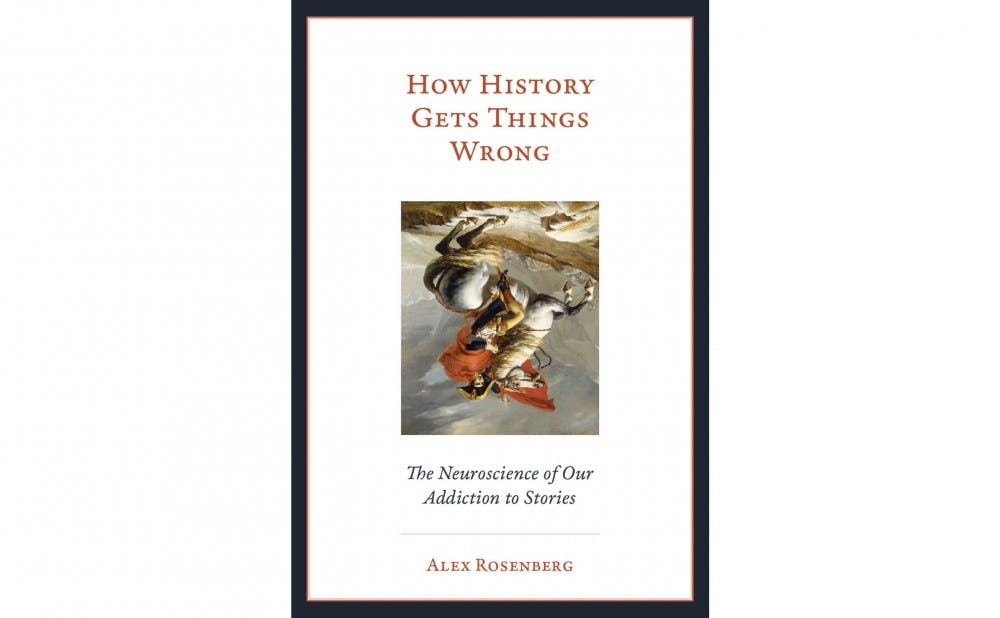Alex Rosenberg, R. Taylor Cole professor of philosophy, recently wrote a new book called "How History Gets Things Wrong: The Neuroscience of Our Addiction to Stories." Rosenberg spoke with The Chronicle to reflect on his book and a wide variety of other subjects ranging from the greatest threat to humanity to Rosenberg’s teenage self. The interview has been edited for length and clarity.
The Chronicle: How would you describe your new book?
Alex Rosenberg: "How History gets Things Wrong" talks about how neuroscience shows us why the theory of mind, which we employ to navigate through our day-to-day lives, which drives our demand for stories and addresses our questions, is profoundly wrong in its account of human behavior. If we want to understand human behavior and channel it into a more constructive and benevolent direction, then we have to give up this theory of mind and substitute science for it.
TC: Do you think science will ever be able to replace the theory of mind?
AR: Science certainly cannot substitute for the theory of mind in entertainment and in moving people to action. "Gulag Archipelago" by Aleksandr Solzhenitsyn or "Mein Kampf" by Adolf Hitler are two profoundly powerful historical stories that have moved people and driven them to action. However, such stories are harmful in that they have promoted patriarchy, xenophobia, nationalism and war. The only way to break that cycle is to craft human institutions and design our future using science instead of the prejudice that was drilled into us by natural selection.
TC: Do you think that narrative history can ever be right?
AR: Of course, history can be right about the particular events, occurrences and dots that it connects. History can establish the chronology of facts such as the Revolutionary War came after the Renaissance or that Partition of India and Pakistan happened before 9/11. It’s when history tries to connect and explain those events by appealing to people’s motives, intentions and calculations that it starts to get things wrong.
TC: What is an example of a historical event from your book that cannot be explained by narrative history?
AR: The sudden emergence, thousand-year persistence and 10-year disappearance of foot-binding in China cannot be explained by religion, culture or narrative history but by game theory.
Binding feet was a fitness reducing process that made everybody worse off. If everybody was binding their daughter’s feet, nobody could cease to do so without condemning them to spinsterhood and so a custom emerged, largely because of the emperors interest in securing the certainty of paternity amongst his concubines. Pushed down the social hierarchy, it was a merry-go-round that nobody could get off of. The system finally unraveled because a small number of people at a certain point in history began to commit themselves to one another to marry within the group, and not to bind feet within the group.
TC: Why is effective history problematic?
AR: When people understand their histories, it gets them angry and riled up against people they have historically been in conflict with. That resentment and a desire for revenge causes them to do bad things. A famous physicist once said, "There are good people who do good things, there are bad people who do bad things, but to get a good person to do a bad thing takes religion." I think it also takes history.
TC: What inspired you to pursue a career in philosophy?
AR: I was a physics major as an undergraduate. I made a conceptual mistake about physics that led me to address philosophical questions. By the time I had figured out the mistake, it was too late to go back into physics.
TC: What would your teenage self think of your current self?
AR: My teenage self would be surprised at my success because I did not have as great expectations or as high ambitions as I should have. My teenage self was very immature, undisciplined and needed to learn a lot of life lessons. Fortunately, I learned them before it was too late.
TC: How did you compare to a modern Duke student?
AR: Many Duke students have serious questions about their own predicament, human predicament, the nature of reality, about values and politics and are driven by curiosity to address and answer these questions. Such Duke students remind me of myself.
TC: What do you think was the biggest American mistake?
AR: The Constitution of the United States. The worst founding document ever contrived, specifically designed to obstruct democracy and ensure the continued domination of the rich over everyone else.
TC: What do you think is the biggest challenge to humanity today?
AR: Donald Trump. He’s a dangerous megalomaniac who has no interest in anything but self-aggrandizement. He has the largest quantum of power of any individual in the world, and a disgusting private life.
Get The Chronicle straight to your inbox
Signup for our weekly newsletter. Cancel at any time.

